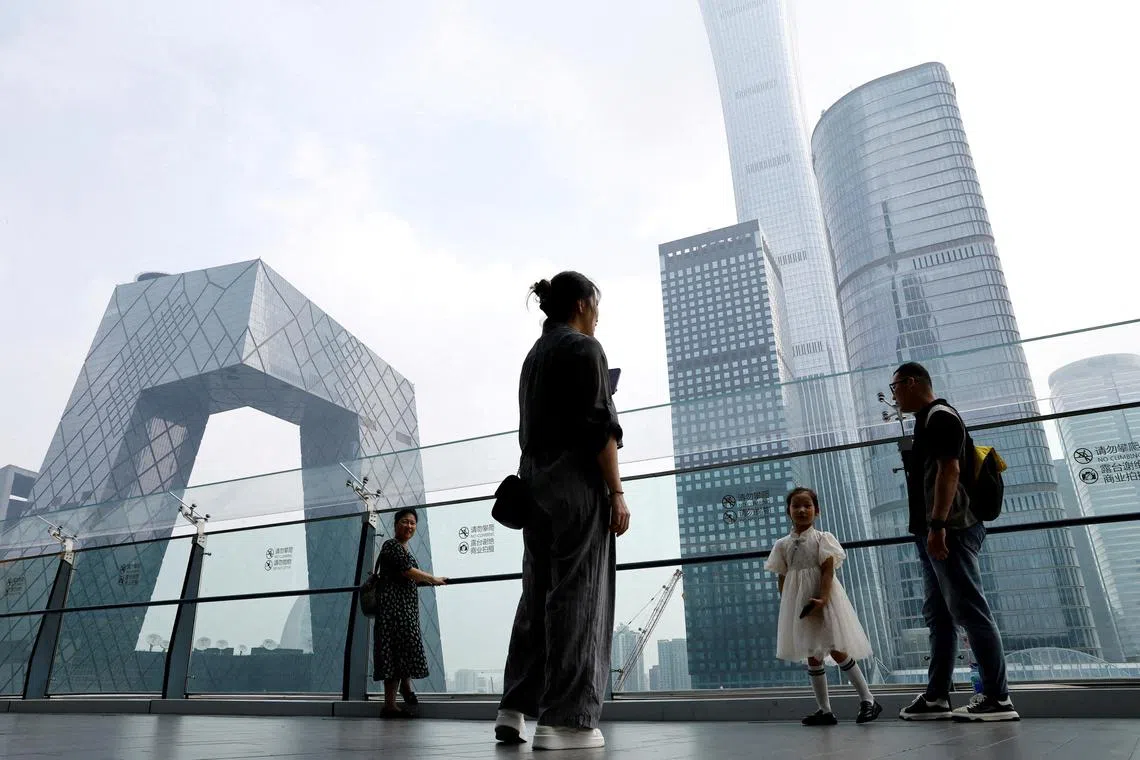News analysis
China’s economic turnaround depends on the will to grow private sector
Sign up now: Get insights on Asia's fast-moving developments

A new law will be rolled out to ensure fair market competition for private firms.
PHOTO: REUTERS
CHONGQING - China has signalled that it is pushing for the growth of its private sector, which economists say is key to its economic recovery and to help solve two of the country’s biggest headaches: local government debt and rising unemployment.
On Oct 14, officials from four agencies said at a press conference in Beijing that the Chinese government will speed up the rolling out of a new law, currently at the public consultation stage, to ensure fair market competition for private firms, which have complained that officials have tended to favour state-owned enterprises.
The new law also aims to encourage private companies to participate in developing advanced technology, which has become an urgent national priority as China seeks technological self-reliance.
China’s economy has been in the doldrums, with economists questioning whether officials can hit the goal of about 5 per cent growth in 2024.
With the private sector contributing 50 per cent of China’s tax revenue, over 60 per cent of its gross domestic product, 70 per cent of its tech innovation and 80 per cent of its urban employment, it is seen as a key pillar in the country’s economic expansion.
It is therefore no surprise that there is a new push to protect and grow the sector.
Vice-Minister for Justice Hu Weilie said at the press conference that the current draft law encourages private firms to play an active role “in developing new productive forces, and to participate in national scientific and technological breakthroughs”.
It “also guarantees firms’ participation in standard setting and the development and utilisation of public data resources, while strengthening the protection of their intellectual property rights”, he added.
But economics professor Albert Hu from China Europe International Business School in Shanghai said that the key to the new law’s success will lie in its enforcement, especially at the local level.
“State-owned enterprises have a natural affinity with the government, which should not become an obstacle for private firms with the required credentials to gain equal access to government procurement or resources,” he added.
The press conference on Oct 14 is the latest indication that China is stepping up its pursuit of private firms as it seeks to bolster faltering business confidence in the world’s second-largest economy.
The stock market valuation of private firms among China’s 100 largest listed companies shrank from a peak of about 55 per cent in mid-2021 to just 33 per cent at the end of June 2024 – a decline of more than 40 per cent in only three years – the Peterson Institute for International Economics, a US think-tank, reported in September.
The decline has weighed heavily on workers and wages, given that 80 per cent of employees are employed in the private sector, the institute said.
The decrease in business confidence has also hit local governments, which are already deeply in debt due to a sharp downturn in the property sector. Local governments rely heavily on selling land for their revenue.
Officials at the press conference, who were from the finance and market regulatory bodies as well as the ministries of justice and industry and information technology, said the government will crack down on illegal charges imposed on private companies, streamline bureaucratic processes and beef up financing support.
China has intensified its messaging on growing the private sector since the National Development and Reform Commission, the country’s top economic planner, held a press conference on Oct 8 that emphasised creating jobs amid the current slowdown.
China’s youth unemployment rate rose to 18.8 per cent in August – a new high since a new tracking system was introduced in December 2023 – while overall urban unemployment edged up 0.1 percentage point to 5.3 per cent.
Premier Li Qiang also told a group of business leaders on Oct 8 that Beijing would “resolutely root out” persistent problems of arbitrary law enforcement in the private sector, such as fines, inspections and forced closures to guarantee companies’ peace of mind, state media reported.
On Oct 12, Finance Minister Lan Fo’an said that the central government will issue bonds to help local governments pay their debts to private companies, among other measures, as he gave assurances that Beijing has further policy room to prop up the ailing economy, if more support is needed.
The European Chamber of Commerce in China is adopting a wait-and-see attitude on the new draft law on private firms.
Its president, Mr Jens Eskelund, told The Straits Times that the “lack of detail... means that it is too early to determine its impact”.
He noted that foreign-invested enterprises, which have a different legal status from Chinese firms, must still follow other laws and regulations specific to foreign investors, according to the draft law.
In September, the European and American chambers of commerce in China reported that business confidence is at an all-time low.
The American Chamber of Commerce said in its latest report that only 47 per cent of its companies are optimistic about their business outlook in China over the next five years – the lowest on record.
China’s tensions with the European Union have further increased lately, with the beginnings of a brutal trade war brewing after the bloc slapped tariffs of up to 35.3 per cent on Chinese electric vehicles due to kick in at the end of October.
Still, the Chinese government’s latest move to boost business confidence is seen as positive.
“The messages (from the latest press conference) are positive, as they show that China’s leaders understand that the confidence in the corporate sector is low, and it is a major problem for economic growth,” said Dr Zhang Zhiwei, chief economist at Pinpoint Asset Management in Hong Kong.



